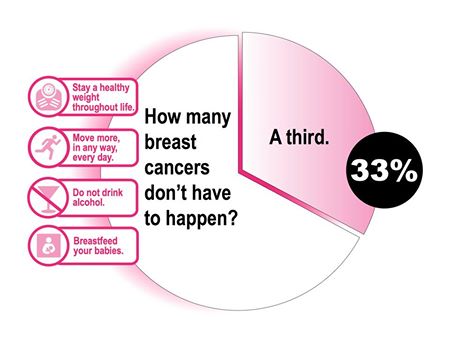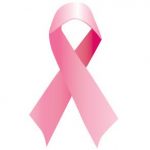Did you know only about 10 percent of breast cancers are hereditary? While you can’t control certain factors that may impact your risk for breast cancer, such as being a woman, getting older, race or ethnicity, you can be proactive about how you take care of yourself.
Lifestyle factors play an important role in many cancers including breast cancer. The American Institute For Cancer Research states that about 1/3 of the most common cancers in the U.S. could be prevented through weight management, a healthy diet and daily exercise. Those three steps can make a big difference!
Here are 10 steps to take now that I’ve compiled from three of my favorite resources: American Cancer Society, Susan G Komen and American Institute for Cancer Research
1. Maintain a healthy body weight throughout your life.
2. Be physically active every day for at least 30 minutes.
3. Eat healthier foods, mostly plants. Limit red meat and avoid processed meats. Reduce consumption of sugar, sodium, saturated fats and processed foods.
4. If you choose to drink, limit to one 5 oz glass of wine a day (or one small cocktail -1.5 oz alcohol).
5. Don’t smoke and quit if you do.
6. Breastfeed, if you can.
7. Limit postmenopausal hormone use.
8. Know your family history for all cancers, not just breast cancer. Discuss with your doctor whether or not you have dense breasts which can be 6 times more likely to develop cancer and make it harder for mammograms to detect breast cancer. Ask your doctor which screening tests are right for you if you are at a higher risk.
9. Have a mammogram every year starting at age 40 if you are at average risk.
10. Have a clinical breast exam at least every 3 years starting at age 20, and every year starting at age 40. Manually examine your breasts each month. (That’s how I found a lump in my breast in 2009.)

Infographic:: www.AICR,org
Breast cancer remains the second leading cause of cancer death among women in the USA after lung cancer. One in 8 women are diagnosed. In 2016 an estimated 246,660 new cases of invasive breast cancer will be diagnosed and 40,450 women will die from the disease. While medical science continues to work on better ways to detect and treat all breast cancers, the best protection you can take is to be proactive about your overall health and diligent about your breast health.
Every woman deserves to be one in a million, not one in eight. #FearlessFabulousYou










